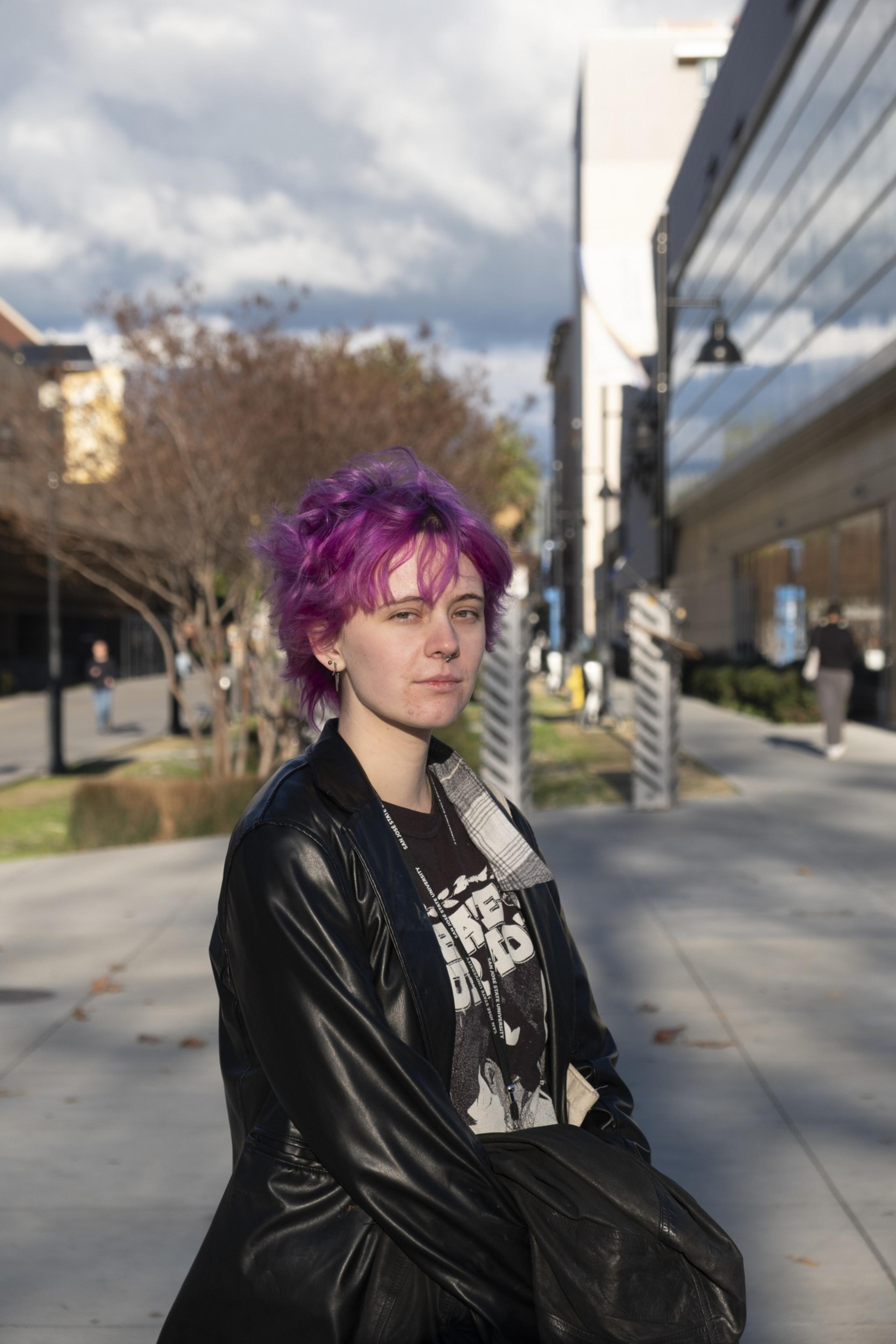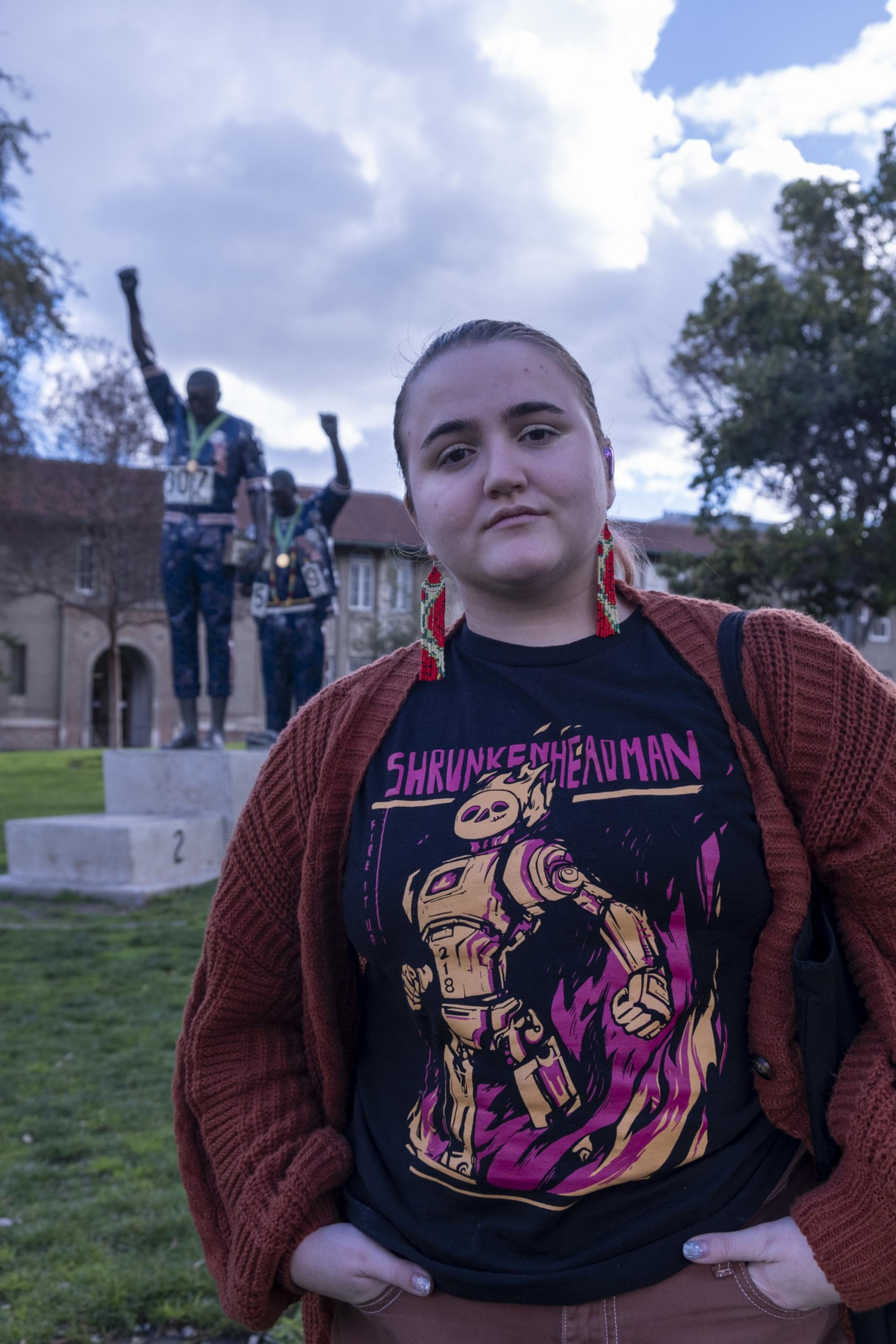Among Donald Trump’s obsessions during his presidential campaign was an athlete whose name almost no people knew, in a sport few watched, at a college most had never heard of. In his diatribe against the athlete, a volleyball player at San Jose State University, Trump insisted she used her physical strength to unfairly dominate.
But many SJSU students who spoke to The Standard don’t see it that way.
During a three-hour campus visit Friday, several students said that they hadn’t heard about Trump’s executive order barring transgender athletes (opens in new tab) from girls’ and women’s sports, or about the Title IX investigation (opens in new tab) into alleged discrimination on SJSU’s part by allowing a trans volleyball player to compete with women.
But they were well aware of the transphobia during the lead-up to the election as Trump put SJSU firmly in the crosshairs, falsely claiming (opens in new tab) that an athlete on the women’s volleyball team injured an opponent by spiking a ball into her face.
Third-year animation student Emma Todhunter called fears around transgender women competing in women’s sports “antifeminist.”
“It’s saying women can’t compete in sports as well as men can, that men are better,” Todhunter said.
She acknowledged that being born biologically male could be a natural advantage in sports but argued that it’s no different from other physiological advantages among athletes.
“It’s as much of an advantage as being tall and playing basketball,” Todhunter said. “This is only an issue because of transphobic ideals.”
She called Trump’s executive order and the Title IX investigation “exhausting.”
“It feels like we’re going backward,” she said. “When I was 11, gay marriage was federally approved. It feels hateful and like he’s creating an enemy to gain supporters.”

During an appearance on Fox News in October, Trump called out the transgender San Jose State volleyball player and proclaimed (opens in new tab) that if elected, he would ban all transgender women from competing in women’s sports.
“I saw the slam, it was a slam. I never saw a ball hit so hard, hit the girl in the head,” Trump said of an Oct. 10 match between the Spartans and San Diego State University, where the player allegedly (opens in new tab) spiked a ball into SDSU junior Keira Herron’s face. “But other people, even in volleyball, they’ve been permanently, I mean, they’ve been really hurt badly. Women playing men.”
In reality, the spike hit the player in the arm, and ESPN found that the ball traveled at 60 mph, around the average for a spike in NCAA women’s volleyball, according to the San Francisco Chronicle (opens in new tab).
Other colleges refused to play (opens in new tab) against SJSU during the 2024 season, specifically because the team had a transgender athlete on the roster.
The Standard tried to speak to eight student-athletes, including six women volleyball players, about the controversy, but none agreed to be interviewed, with some saying they would “get in trouble” for speaking to the media.
SJSU said it’s committed to ensuring students are treated without discrimination and will “fully engage” with the Title IX investigation. The university did not confirm Fleming’s gender or share information about her time at the school or the women’s volleyball team.
“While we adhere to legal and regulatory requirements, San José State will continue to act within our authority to uphold the values that define us as an institution,” a spokesperson said in an emailed statement. “Our focus remains on our values, including fostering an environment that cultivates compassion, where every student has the opportunity to thrive.”

First-year business administration student Tylor Cammarata said he thinks that in individual sports, like track, people should compete against peers based on their biological sex, not their gender, saying men are generally stronger than women.
He said on team sports, individual physical differences are less important, allowing fair competition between teams whether or not they have transgender athletes.
Cammarata said he disagrees with Trump’s executive order, although he hadn’t heard of the Title IX investigation against his school.
“They should have the right to choose their gender, their sport,” he said. “I don’t think they should put that [order] in place.”

Others, like third-year communications student Julian, were less accepting.
“I don’t support LGBT, any of that,” he said. “Men should play against men. Women should play against women.”
Still, Julian, who declined to provide his last name, said that despite his views, he doesn’t see it as an issue that should captivate the country’s right-wingers as it did in the months preceding Trump’s ascension to power.
“I don’t agree with [the trans athlete] playing, but escalating it doesn’t help anyone,” he said. “How’s that helping with lowering groceries? Last semester eggs were $3, this semester they’re $9.”

Other students said that they haven’t paid much attention to the debate, even as their own university is firmly entrenched in it.
“Very generally, I support trans rights,” said Jose P. He declined to take a stand on whether trans athletes should be allowed to compete on collegiate sports teams aligning with their gender, saying he didn’t know enough about the issue.
“I just don’t know what’s going on,” he said.
“They should be allowed to play. I don’t really think much of it,” second-year hospitality major Miguel Lorenzo said. “I’m just trying to live my life.”

